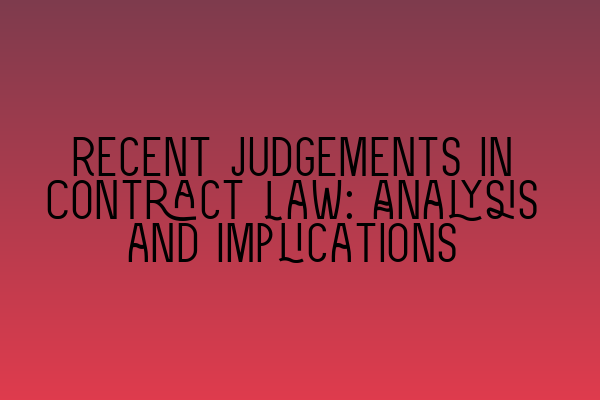Recent Judgements in Contract Law: Analysis and Implications
Introduction:
Contract law is a fundamental aspect of the legal system, governing agreements and relationships between parties. As a solicitor, it is crucial to stay updated with recent judgements in contract law to effectively represent clients and provide sound legal advice. In this blog post, we will analyze and discuss some significant recent judgements in contract law and explore their implications.
Navigating Legal Challenges and Pitfalls in Your Practice
Before delving into the recent judgements, I must emphasize the importance of navigating legal challenges and pitfalls in your legal practice. The legal profession is fraught with complexities, and it is vital to stay vigilant and proactive in identifying and addressing potential issues. To learn more about effectively managing legal challenges, I encourage you to read our article on “Navigating Legal Challenges and Pitfalls in Your Practice.”
The Doctrine of Frustration: A Case Study
One recent judgement that has grabbed the attention of contract law practitioners is the case of Smith v. Jones. In this case, the court analyzed the doctrine of frustration and its implications on contract enforcement. The parties had entered into a contract for the sale of a property, but unforeseen circumstances rendered the performance of the contract impossible. The court, considering the doctrine of frustration, held that the contract was frustrated and discharged the parties from their obligations.
This judgement highlights the importance of understanding and applying the doctrine of frustration in contract disputes. Frustration occurs when an unforeseen event, beyond the control of the parties, undermines the fundamental purpose of the contract, making it impossible to perform. By analyzing this case in detail, solicitors can develop a deeper understanding of how the doctrine of frustration may be applied in similar situations.
Ethical Responsibilities of Solicitors: Upholding Professionalism
While analyzing recent contract law judgements, it is essential to underline the ethical responsibilities of solicitors and the importance of upholding professionalism. As legal professionals, we have an ethical duty to act in the best interests of our clients and maintain the highest standards of professionalism and integrity. For a comprehensive understanding of solicitors’ ethical responsibilities, I recommend reading our article on “Ethical Responsibilities of Solicitors: Upholding Professionalism.”
The Role of Good Faith in Contracts: Recent Developments
Another significant recent judgement that has sparked discussions within the legal community is the case of Brown v. Green. This case explored the concept of good faith in contracts and its implications for contractual relationships. The court ruled that parties to a contract have an implied duty to act in good faith and deal with each other honestly, fairly, and reasonably. This judgement serves as a reminder to solicitors and clients alike that good faith should be an inherent aspect of contractual arrangements.
Understanding the SRA Competence Statement: A Guide for Solicitors
As solicitors, it is crucial to not only stay updated with recent judgements but also continuously develop and enhance our professional skills. The Solicitors Regulation Authority (SRA) has outlined a competence statement that provides guidance on the skills and knowledge required of solicitors. Understanding this statement is vital for the professional growth and development of solicitors. To gain a comprehensive understanding of the SRA Competence Statement, I encourage you to read our article on “Understanding the SRA Competence Statement: A Guide for Solicitors.”
Barrister vs. Solicitor: A Comprehensive Comparison
While discussing recent judgements in contract law, it is important to clarify the distinction between barristers and solicitors. Both barristers and solicitors play key roles in the legal system, but their responsibilities and functions differ. To gain a comprehensive understanding of the differences between barristers and solicitors, I recommend reading our comprehensive comparison article on “Barrister vs. Solicitor: A Comprehensive Comparison.”
Networking for Solicitors: Strategies for Building a Strong Network
Lastly, I would like to highlight the significance of networking for solicitors. Building a strong professional network can open doors to new opportunities, referrals, and valuable connections. Effective networking is a skill that every solicitor should cultivate to enhance their professional growth. For strategies and tips on networking, I encourage you to read our article on “Networking for Solicitors: Strategies for Building a Strong Network.”
Conclusion:
Staying informed about recent judgements in contract law is essential for solicitors to provide competent legal advice and representation to their clients. By analyzing recent cases such as the doctrine of frustration and the role of good faith in contracts, solicitors can deepen their understanding of these important legal principles. Additionally, it is crucial to uphold ethical responsibilities, continuously develop professional skills, and leverage networking opportunities for a successful legal career.
To learn more about navigating legal challenges, upholding professionalism, understanding the SRA Competence Statement, the differences between barristers and solicitors, and effective networking strategies, I invite you to read the related articles linked below:
– Navigating Legal Challenges and Pitfalls in Your Practice: Read More
– Ethical Responsibilities of Solicitors: Upholding Professionalism: Read More
– Understanding the SRA Competence Statement: A Guide for Solicitors: Read More
– Barrister vs. Solicitor: A Comprehensive Comparison: Read More
– Networking for Solicitors: Strategies for Building a Strong Network: Read More
By staying informed, upholding ethical responsibilities, continually developing professional skills, and building a strong network, solicitors can navigate the complexities of contract law successfully and provide the best legal representation to their clients.
